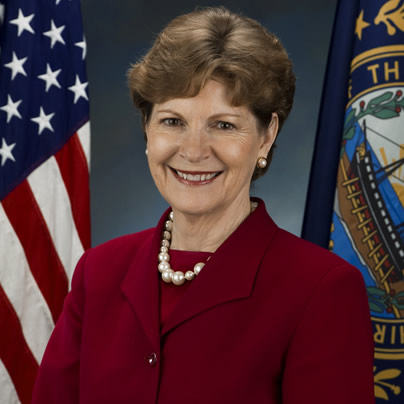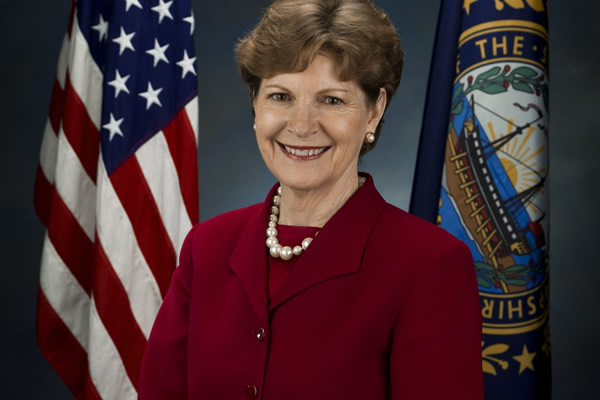National
Shaheen honors lesbian guardsman in Senate floor speech
Legislation introduced to provide equal benefits for gay troops


Sen. Jeanne Shaheen (D-N.H.) honored the life of lesbian guardsman Charlie Morgan on the Senate floor. (Pubic domain photo)
The senior senator from New Hampshire took to the Senate floor on Thursday to honor the life of a recently deceased lesbian guardsman who fought against the Defense of Marriage Act.
Sen. Jeanne Shaheen (D-N.H.) said Chief Warrant Officer Charlie Morgan, who died Sunday after battling breast cancer and DOMA, was one of the nation’s “outstanding citizens” and touted the late service member’s efforts in the military and LGBT advocacy.
“Many know Charlie for the national attention she received over the last several years advocating on behalf of fellow gay service members and their families,” Shaheen said. “However, first and foremost Charlie was a soldier.”
Shaheen was apparently holding back tears on the Senate floor as she informed the chamber that Morgan was “just 48 years old” upon her death.
As Shaheen noted, Morgan began her military service by enlisting in the U.S. Army in 1982 and participating in a year-long deployment to Kuwait following the terrorist attacks of Sept. 11, 2001. Afterward, Morgan became involved in LGBT activism after being diagnosed with incurable breast cancer so that upon her death her spouse Karen Morgan and five-year-old daughter Casey Elena would have access to military spousal benefits.
A plaintiff in OutServe-SLDN’s lawsuit against DOMA, Morgan met with staff from U.S. House Speaker John Boehner (R-Ohio) last year to urge him to discontinue House Republican defense of the anti-gay law in court. She also testified before the 15-member Democratic Party draft platform committee in favor of including a marriage equality plank in the document, which was ultimately added.
“I hope that Charlie Morgan knew how many lives she touched and how greatly we admired her efforts,” Shaheen said. “I know that she will be sorely missed, and that her example will continue to guide us well into the future.”
Shaheen said she met Morgan in 2011 when she contacted the senator’s office upon her return from Kuwait. Morgan received notification that her spouse would be unable to attend a transition program known as National Guard Yellow Ribbon Reintegration. The senator said she worked with Defense Secretary Leon Panetta to ensure Morgan’s family could participate.
Following Morgan’s death, Shaheen said she’s received more than 2,000 messages of support from citizens all across our country. She read a couple of them on the Senate floor. One read, “Charlie is a hero to many of us. Thank you for making your lives public so others can live their lives privately in love.” Another read, “Thank you so much Charlie for all you have done. You will not be forgotten, and your service, work and legacy will live on. Those of us left behind will honor you by continuing on in this all-important fight for equality.”
Shaheen noted Morgan died just one day before the Pentagon announced that it would extend limited partner benefits to gay troops, saying “it is unfortunate” Morgan was unable to live to see the accomplishment.
Concluding her speech, Shaheen announced that she would soon introduce a bill she called the Charlie Morgan Act, which she said would end a number of restrictions of benefits for legal spouses for service members, regardless of sexual orientation.
Smith reintroduces benefits bill for gay troops
In related news, Rep. Adam Smith (D-Wash.), the top Democrat on the House Armed Services Committee, announced on Thursday that he reintroduced the Military Spouse Equal Treatment Act, which would change the definition of “spouse” under U.S. code governing the rights of service members. Smith introduced the bill for the first time last year.
“This bill would make sure that service members and veterans with same-sex spouses receive the same benefits as their heterosexual counterparts,” Smith said. “All spouses of those serving in our Armed Services make tremendous sacrifices for our country, and no one should be prevented from receiving hard-earned benefits simply because they are the same sex as their partner.”
U.S. code under Titles 10, 32, and 38 restricts the definition of spouse to opposite-sex couples. Even if DOMA were repealed, gay service members would still be unable to receive certain major ticket partner benefits — like health and pension benefits — with these sections of U.S. code still in place. Smith’s bill would alter these provisions of U.S. code and add a favorable controlling definition of “spouse” to Title 37.
Allyson Robinson, executive director of OutServe-SLDN, said passage of the legislation would put gay service members on the same footing as their straight comrades.
“Treating service members equally, without partiality or favoritism, is one of the most basic principles of sound military leadership,” Robinson said. “For this reason, equality for LGBT troops and their families is a national security issue. Commanders should not be forced to treat some service members like second-class citizens because the federal government does not recognize their marriages.”
Among the original co-sponsors of the legislation is Rep. Mark Pocan (D-Wis.), a freshman gay member of the U.S. House. In a statement, Pocan called the legislation an important step forward after the repeal of “Don’t Ask, Don’t Tell.”
“Supporting our servicemen and women and our veterans also means supporting their spouses and families, whose sacrifices often go unseen and unrecognized,” Pocan said. “This support should not be contingent on whether a member of our military is gay or straight.”
Watch a video of Shaheen’s floor speech here:
State Department
State Department releases annual human rights report
Antony Blinken reiterates criticism of Uganda’s Anti-Homosexuality Act

Secretary of State Antony Blinken on Monday once again reiterated his criticism of Uganda’s Anti-Homosexuality Act upon release of the State Department’s annual human rights report.
“This year’s report also captures human rights abuses against members of vulnerable communities,” he told reporters. “In Afghanistan, the Taliban have limited work opportunities for women, shuttered institutions found educating girls, and increasing floggings for women and men accused of, quote, ‘immoral behavior,’ end quote. Uganda passed a draconian and discriminatory Anti-Homosexuality Act, threatening LGBTQI+ individuals with life imprisonment, even death, simply for being with the person they loved.”
Ugandan President Yoweri Museveni last May signed the law, which contains a death penalty provision for “aggravated homosexuality.”
The U.S. subsequently imposed visa restrictions on Ugandan officials and removed the country from a program that allows sub-Saharan African countries to trade duty-free with the U.S. The World Bank Group also announced the suspension of new loans to Uganda.
Uganda’s Constitutional Court earlier this month refused to “nullify the Anti-Homosexuality Act in its totality.” More than a dozen Ugandan LGBTQ activists have appealed the ruling.
Clare Byarugaba of Chapter Four Uganda, a Ugandan LGBTQ rights group, on Monday met with National Security Council Chief-of-Staff Curtis Ried. Jay Gilliam, the senior LGBTQI+ coordinator for the U.S. Agency for International Development, in February traveled to Uganda and met with LGBTQ activists who discussed the Anti-Homosexuality Act’s impact.
“LGBTQI+ activists reported police arrested numerous individuals on the basis of their sexual orientation or gender identity and subjected many to forced anal exams, a medically discredited practice with no evidentiary value that was considered a form of cruel, inhuman, and degrading treatment and could amount to torture,” reads the human rights report.
The report, among other things, also notes Ugandan human rights activists “reported numerous instances of state and non-state actor violence and harassment against LGBTQI+ persons and noted authorities did not adequately investigate the cases.”
Report highlights anti-LGBTQ crackdowns in Ghana, Hungary, Russia
Ghanaian lawmakers on Feb. 28 approved the Promotion of Proper Human Sexual Rights and Ghanaian Family Values Bill. The country’s president, Nana Akufo-Addo, has said he will not sign the measure until the Ghanaian Supreme Court rules on whether it is constitutional or not.
The human rights report notes “laws criminalizing consensual same-sex sexual conduct between adults” and “crimes involving violence or threats of violence targeting lesbian, gay, bisexual, transgender, queer or intersex persons” are among the “significant human rights issues” in Ghana.
The report documents Hungarian Prime Minister Viktor Orbán and members of his right-wing Fidesz party’s continued rhetoric against “gender ideology.” It also notes Russia’s ongoing crackdown against LGBTQ people that includes reports of “state actors committed violence against LGBTQI+ individuals based on their sexual orientation or gender identity, particularly in Chechnya.”
The report specifically notes Russian President Vladimir Putin on July 24 signed a law that bans “legal gender recognition, medical interventions aimed at changing the sex of a person, and gender-affirming care.” It also points out Papua New Guinea is among the countries in which consensual same-sex sexual relations remain criminalized.

The Cook Islands and Mauritius in decriminalized homosexuality in 2023.
The report notes the Namibia Supreme Court last May ruled the country must recognize same-sex marriages legally performed outside the country. The report also highlights the Indian Supreme Court’s ruling against marriage equality that it issued last October. (It later announced it would consider an appeal of the decision.)
Congress requires the State Department to release a human rights report each year.
The Biden-Harris administration in 2021 released a memorandum that committed the U.S. to promoting LGBTQ+ and intersex rights abroad.
The full report can be read here.
National
Same-sex couples vulnerable to adverse effects of climate change
Williams Institute report based on Census, federal agencies

A new report by the Williams Institute at the UCLA School of Law finds that same-sex couples are at greater risk of experiencing the adverse effects of climate change compared to different-sex couples.
LGBTQ people in same-sex couple households disproportionately live in coastal areas and cities and areas with poorer infrastructure and less access to resources, making them more vulnerable to climate hazards.
Using U.S. Census data and climate risk assessment data from NASA and the Federal Emergency Management Agency, researchers conducted a geographic analysis to assess the climate risk impacting same-sex couples. NASA’s risk assessment focuses on changes to meteorological patterns, infrastructure and built environment, and the presence of at-risk populations. FEMA’s assessment focuses on changes in the occurrence of severe weather events, accounting for at-risk populations, the availability of services, and access to resources.
Results show counties with a higher proportion of same-sex couples are, on average, at increased risk from environmental, infrastructure, and social vulnerabilities due to climate change.
“Given the disparate impact of climate change on LGBTQ populations, climate change policies, including disaster preparedness, response, and recovery plans, must address the specific needs and vulnerabilities facing LGBTQ people,” said study co-author Ari Shaw, senior fellow and director of international programs at the Williams Institute. “Policies should focus on mitigating discriminatory housing and urban development practices, making shelters safe spaces for LGBT people, and ensuring that relief aid reaches displaced LGBTQ individuals and families.”
“Factors underlying the geographic vulnerability are crucial to understanding why same-sex couples are threatened by climate change and whether the findings in our study apply to the broader LGBTQ population,” said study co-author Lindsay Mahowald, research data analyst at the Williams Institute. “More research is needed to examine how disparities in housing, employment, and health care among LGBT people compound the geographic vulnerabilities to climate change.”
Read the report
Federal Government
Lambda Legal praises Biden-Harris administration’s finalized Title IX regulations
New rules to take effect Aug. 1

The Biden-Harris administration’s revised Title IX policy “protects LGBTQ+ students from discrimination and other abuse,” Lambda Legal said in a statement praising the U.S. Department of Education’s issuance of the final rule on Friday.
Slated to take effect on Aug. 1, the new regulations constitute an expansion of the 1972 Title IX civil rights law, which prohibits sex-based discrimination in education programs that receive federal funding.
Pursuant to the U.S. Supreme Court’s ruling in the landmark 2020 Bostock v. Clayton County case, the department’s revised policy clarifies that discrimination on the basis of sexual orientation and gender identity constitutes sex-based discrimination as defined under the law.
“These regulations make it crystal clear that everyone can access schools that are safe, welcoming and that respect their rights,” Education Secretary Miguel Cardona said during a call with reporters on Thursday.
While the new rule does not provide guidance on whether schools must allow transgender students to play on sports teams corresponding with their gender identity to comply with Title IX, the question is addressed in a separate rule proposed by the agency in April.
The administration’s new policy also reverses some Trump-era Title IX rules governing how schools must respond to reports of sexual harassment and sexual assault, which were widely seen as imbalanced in favor of the accused.
Jennifer Klein, the director of the White House Gender Policy Council, said during Thursday’s call that the department sought to strike a balance with respect to these issues, “reaffirming our longstanding commitment to fundamental fairness.”
“We applaud the Biden administration’s action to rescind the legally unsound, cruel, and dangerous sexual harassment and assault rule of the previous administration,” Lambda Legal Nonbinary and Transgender Rights Project Director Sasha Buchert said in the group’s statement on Friday.
“Today’s rule instead appropriately underscores that Title IX’s civil rights protections clearly cover LGBTQ+ students, as well as survivors and pregnant and parenting students across race and gender identity,” she said. “Schools must be places where students can learn and thrive free of harassment, discrimination, and other abuse.”
-

 South America4 days ago
South America4 days agoDaniel Zamudio murderer’s parole request denied
-

 Maryland5 days ago
Maryland5 days agoMontgomery County police chief discusses arrest of trans student charged with planned school shooting
-

 Commentary5 days ago
Commentary5 days agoWorld ‘isn’t much different today’
-

 State Department19 hours ago
State Department19 hours agoState Department releases annual human rights report











